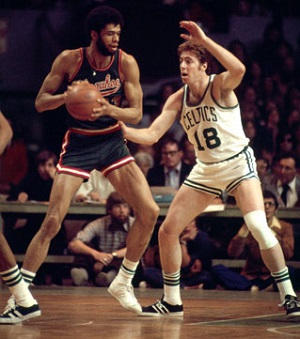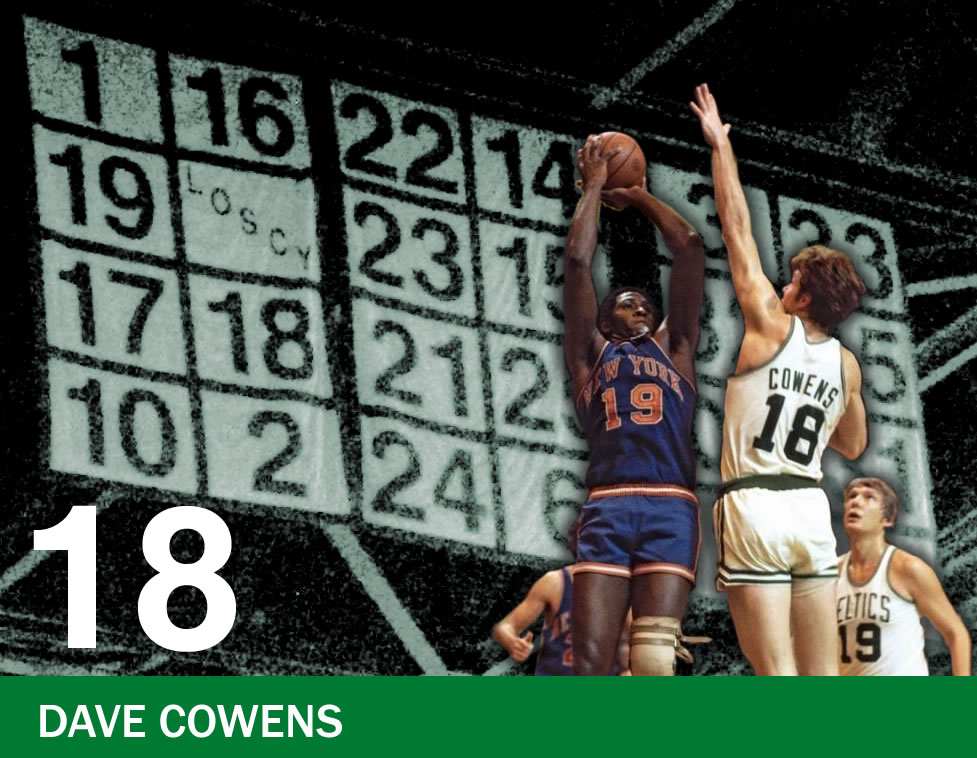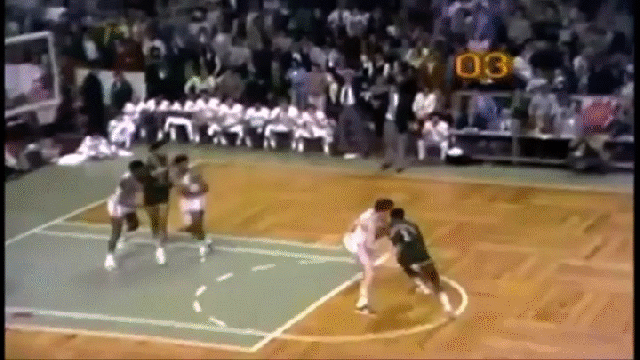From now until February 11, Red’s Army will be posting stories about the players behind the Celtics’ 22 retired numbers and that one retired nickname. Stories will be posted in the order that the numbers were retired.
When Bill Russell retired after the 1969 season, Celtics fans and Boston media naturally wondered: How will Red Auerbach replace the greatest center of all time? The answer came just one year later.
The Celtics finished 34-48 in their first season post-Russell, so Red had the No. 4 overall pick in the 1970 NBA Draft. Everyone wanted Bob Lanier, the 6’11”, 250-pound All-American center, but he was long gone when Boston’s turn came. However, Auerbach knew all along that he actually wanted Dave Cowens of Florida State.

Most observers were shocked. At 6’8” and 230 pounds, Cowens was considered too small to match up in the middle against that era’s dominant big men, such as Wilt Chamberlain, Kareem Abdul-Jabbar and Willis Reed. And few were familiar with Cowens, since Florida State appeared in just one NCAA Tournament game during his four years there.
But in hindsight, this was one of those moves that made Red Auerbach the best damn general manager in NBA history. Look back at the players in that 1970 Draft. Cowens arguably had the best pro career of anyone in that class.
Possessing mobility and a soft shooting touch, Cowens was the perfect center for the Celtics’ fast-breaking, small-ball offense under Coach Tommy Heinsohn. Besides an effective jump hook in the low post, Cowens could turn and shoot with good range from the high post. His trademark became the 18-foot jump shot as a trailer on the fast break.
That first season, Cowens averaged 17.0 points and 15.0 rebounds. He was named co-Rookie of the Year (with Portland’s Geoff Petrie) and made the 1970-71 All-Rookie team.
“Big Red,” as announcer Johnny Most called the red-haired lefty, went on to play 10 seasons with the Cs. He teamed with John Havlicek and Jo Jo White to raise the 1974 and 1976 championship banners in the Garden. Cowens was the NBA’s 1973 Most Valuable Player (after the Cs went 68-14), as well as that season’s All-Star Game MVP.
Cowens became an eight-time All-Star and was also named to three All-NBA and three All-Defensive teams. On the NBA’s 50th anniversary, he was chosen among the 50 Greatest Players in league history. He was inducted into the Hall of Fame in 1991.
For his career, Cowens averaged 17.6 points per game on 46.0% shooting. In the playoffs, those figures were 18.9 and 45.1%.
Cowens made up for his relative lack of height with relentless hustle and intensity. He was a tenacious defender and aggressive rebounder. Overall in his career, Big Red averaged 13.6 rebounds per game in the regular season (eighth highest in NBA history) and 14.4 RPG in the playoffs (sixth best).
By the way, Bob Lanier’s career total rebound averages were further down the list, at 10.1 in the regular season and 9.6 in the playoffs.
The one play that best illustrated Cowens’ on-court attitude is the below sequence from Game 6 of the 1974 Finals. Tie game, final minute, Celtics desperate for stop, and Cowens switches onto one of the all-time great guards, Oscar Robertson. He knocks away the Big O’s dribble, dives and skids across the court, and forces a 24-second violation.
The Bucks eventually won that Game 6 in double overtime, to force a Game 7 in Milwaukee – only to see that become probably Cowens’ finest moment. He scored 28 points and grabbed 14 boards – both game-highs – as the Celtics won Banner 12.
[youtube https://www.youtube.com/watch?v=o_cyvav5tvk?rel=0&start=105]Truth be told, there was also plenty of weirdness in Cowens’ career. On-court, his intensity overflowed in the classic incident where he got fed up with flopping by Mike Newlin of the Rockets. Cowens took a running start, body-blocked Newlin to the floor, then screamed at the ref, “Now that’s a foul!”
Cowens also briefly drove a Boston taxicab, just to see what it was like. The most unexpected episode, though, came eight games into the 1976-77 season. The Celts were the defending champs, yet Cowens suddenly said he was burned out and needed to step away from the team. Red didn’t fight him, so Cowens missed about 30 games before returning in mid-January.
One can only imagine how these events would be received in today’s environment of Twitter and 24/7 sports talk.
By the 1978-79 season, Havlicek had retired, Jo Jo was injured and would soon be traded, and the Celtics were on their way to missing the playoffs for the second straight year. They lost 12 of their first 14, so coach Tom Sanders was fired and Cowens was inexplicably named player-coach. Perhaps it was because the Celtics’ owner, John Y. Brown, was a meddler and probably didn’t want to pay another salary.
Cowens had no coaching experience and it didn’t go well. Boston finished 29-53 and Cowens went back to only playing. Player-coaches were common in the NBA’s early years, but Cowens turned out to be the last one.
Cowens’ final season in Boston (1979-80) happened to also be Larry Bird’s first. The Celtics zoomed up to 61 wins, as Cowens averaged 14.2 points and 8.1 rebounds. That summer, Auerbach acquired Robert Parish and Kevin McHale. Everything was looking up, yet Cowens abruptly felt he had no more to give. He announced his retirement during training camp.
Two years later, again out of the blue, Cowens was persuaded to come out of retirement by his former teammate and then-Bucks coach Don Nelson. Cowens played 40 games for Milwaukee, averaging 8.1 points and 6.9 boards at age 34. But the Bucks didn’t get him for free. Auerbach made it clear the Cs still owned the rights to Big Red. The Bucks had to give up point guard Quinn Buckner, who became a solid contributor off Boston’s bench, even winning a ring in 1984.
That was finally the end of Cowens’ playing career. He went on to coach with moderate success, for five years in assistant jobs and five more as head coach in Charlotte and at Golden State.
[youtube https://www.youtube.com/watch?v=fAXc6u_jGVM?rel=0]Cowens’ playing stats at Basketball Reference
Cowens’ coaching stats at Basketball Reference
Biography on Celtics.com Legends section
The retired numbers project:
Add The Sports Daily to your Google News Feed!

